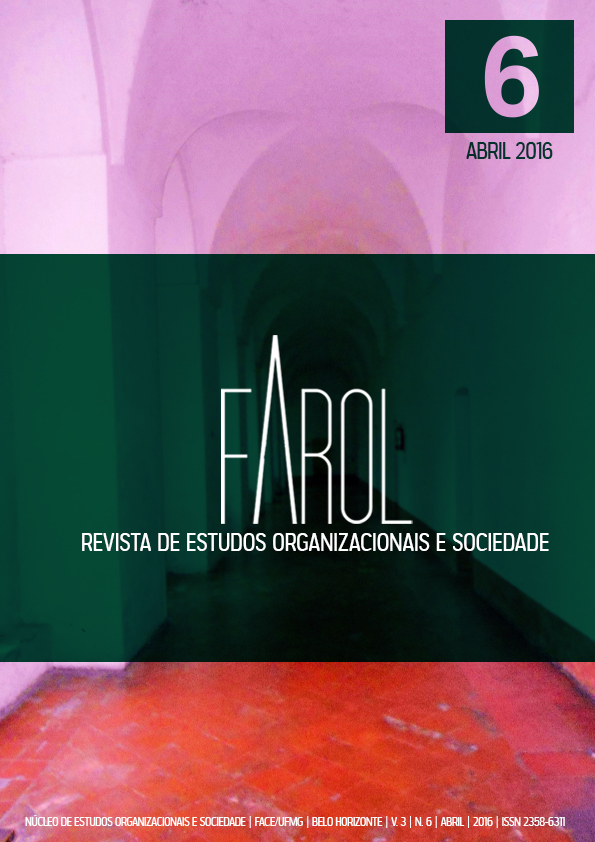ENSAIO SOBRE A PERSPECTIVA HABITAR E SUAS POSSÍVEIS CONTRIBUIÇÕES PARA OS ESTUDOS ORGANIZACIONAIS
DOI:
https://doi.org/10.25113/farol.v3i6.2508Palavras-chave:
Dwelling perspective, Life-world, Living body, Phenomenology, Organisational learning.Resumo
The purpose of this essay is to introduce the dwelling perspective as a possible addition to the phenomenological approaches to organisational learning. Dwelling is the process of active engagement of the living body with the environment.Adopting such a perspective means supporting the idea of knowledge born of immediate experience, being preivy to the understandings that people derive from their lived, everyday involvement in the world. The paper presents new possibilities of research on what the relation is between workers and organisations, since the dwelling perspective enables the comprehension that the workplace is not only inhabited, but it is a living space. Nonetheless, studies on organisational learning that take practice-based perspectives can consider learning as part of the dwelling process.
Referências
BOURDIEU, P. Outline of a Theory of Practice. New York, NY: Cambridge University Press, 2013.
GÄRTNER, C. Cognition, knowing and learning in the flesh: Six views on embodied knowing in organization studies. Scandinavian Journal of Management, Vol. 29, pp. 338–352, 2013.
GIBSON, J. The Ecological Approach to Visual Perception. London: Lawrence Erlbaum, 1979.
HEIDEGGER, M. Poetry, Language, Thought. New York, NY: Harper & Row, 1971.
INGOLD, T. Perceptions of Environment: Essays on Livelihood, Dwelling and Skill. London and New York, NY: Routledge, 2000.
KÜPERS, W. Embodied “inter-learning” – an integral phenomenology of learning in and by organizations. The Learning Organization, Vol. 15, N. 5, pp. 388–408, 2008.
MERLEAU-PONTY, M. Phenomenology of Perception. New York, NY: Routledge, 2012.
RECKWITZ, A. Affective spaces: A praxeological outlook. Rethinking History: The Journal of Theory and Practice, Vol. 16, N. 2, pp. 241–258, 2012.
SANDBERG, J.; DALL’ALBA, G. Returning to practice anew: A life-world perspective. Organization Studies, Vol. 30, N. 12, pp. 1349–1368, 2009.
SANDBERG, J.; TSOUKAS, H. Grasping the logic of practice: Theorizing through practical rationality. Academy of Management Review, Vol. 36, N. 2, pp. 338–360, 2011.
SCHATZKI, T. Practices and actions: A Wittgensteinian critique of Bourdieu and Giddens. Philosophy of the Social Sciences, Vol. 27, N. 283, pp. 283–308, 1997.
SCHATZKI, T. Subject, body, place. Annals of the Association of American Geographers, Vol. 91, N. 4, pp. 698–702, 2001.
STYHRE, A. The (re)embodied organization: Four perspectives on the body in organizations. Human Resource Development International, Vol. 7, N. 1, pp. 101–116, 2004.
YAKHLEF, A. The corporeality of practice-based learning. Organization Studies, Vol. 31, N. 4, pp. 409–430, 2010.
YANOW, D.; TSOUKAS, H. What is reflection-in-action? A phenomenological account. Journal of Management Studies, Vol. 46, N. 8, pp. 1339–1364, 2009.
Downloads
Publicado
Edição
Seção
Licença
Assume-se que em qualquer das modalidades de contribuições aceitas pela Farol – Revista de Estudos Organizacionais e Sociedade, ao submeter um trabalho, o(s) autor(es) se reconhece(m) como detentor(es) do direito autoral sobre ele e autoriza(m) seu livre uso pelos leitores, podendo ser, além de lido, baixado, copiado, distribuído, adaptado e impresso, desde que seja atribuído o devido crédito pela criação original. Em caso de aprovação do trabalho para publicação, os direitos autorais (inclusive os direitos de tradução) são exclusivamente do(s) autor(es).
Os autores devem concordar com os seguintes termos relativos aos Direitos Autorais:
a. Autores mantém os direitos autorais e concedem à revista o direito de primeira publicação, com o trabalho simultaneamente licenciado sob a Licença Creative Commons Attribution que permite o compartilhamento do trabalho com reconhecimento da autoria e publicação inicial nesta revista.
b. Autores têm autorização para assumir contratos adicionais separadamente, para distribuição não-exclusiva da versão do trabalho publicada nesta revista (ex.: publicar em repositório institucional ou como capítulo de livro), com reconhecimento de autoria e publicação inicial nesta revista.
c. Autores têm permissão e são estimulados a publicar e distribuir seu trabalho online (ex.: em repositórios institucionais ou na sua página pessoal) a qualquer ponto antes ou durante o processo editorial, já que isso pode gerar alterações produtivas, bem como aumentar o impacto e a citação do trabalho publicado (Veja O Efeito do Acesso Livre).

